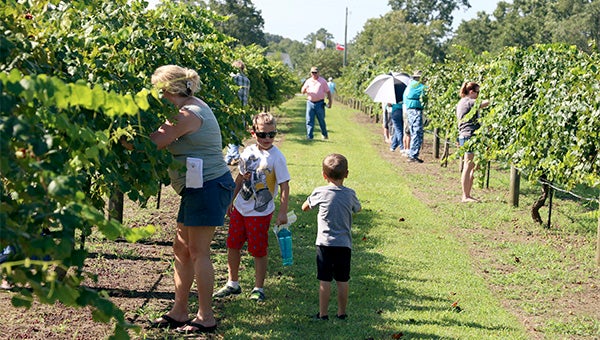Muscadine Field Day in McNeill
Published 7:00 am Friday, September 2, 2016

free samples: A large crowd paid a visit to the McNeill Research Unit on Saturday as part of the annual Muscadine Field Day. During the event attendees were provided bags that they could use to bring some of the fruit home.
Photo by Jeremy Pittari
Dozens of people went to the Mississippi State Extension McNeill Research Unit on Saturday to hear about the best methods of growing muscadines and sample some of the locally grown fruit.
The muscadine vine is a type of grape native to the South. At the McNeill Research Unit, several varieties of the plant are grown in an attempt to determine the those that are the most resistant to insects and disease and those that are self-pollinating or need the assistance of another vine.
During the two-hour long event, several horticulturalists, entomologists and other specialized personnel shared their expertise on how to grow the best vines.
One of those tips included having the soil’s pH level tested. Dr. Eric T. Stafne, MSU Fruit Crop Specialist, said that the best pH for muscadines is 6.5. Soil testing is offered by the MSU Extension Service. He suggested using fertilizer only after the plants have become acclimated to their new environment. New plants can be started in pots, and later transplanted in the yard.
Homeowners interested in having their soil tested may want to save their money if they only plan to grow a few plants.
However, for those who plan to grow many plants having the soil tested is recommended.
It could take up to five years for a muscadine vine to mature and start producing fruit, Stafne said. He suggested having the soil tested about every two years.
Plants suffering from a magnesium deficiency will produce fruit that drops to the ground prematurely.
That and other problems can usually be determined by conducting a tissue test.
When growing several varieties, it’s best to plant self pollinating plants next to those that need help propagating fruit, said Dr. Stephen Stringer, a USDA muscadine breeder.
Muscadines are not just good to eat, they also have many health benefits, if they are eaten correctly.
Dr. Donna Shaw, a USDA horticulturist, advised the crowd that in order to reap those benefits, the skins of the fruit must be eaten. She said darker berries have more health benefits.
After the presentation attendees were provided a gallon bag they could use to take some of the fruit home.
Muscadine Field Day is held annually at the site.



